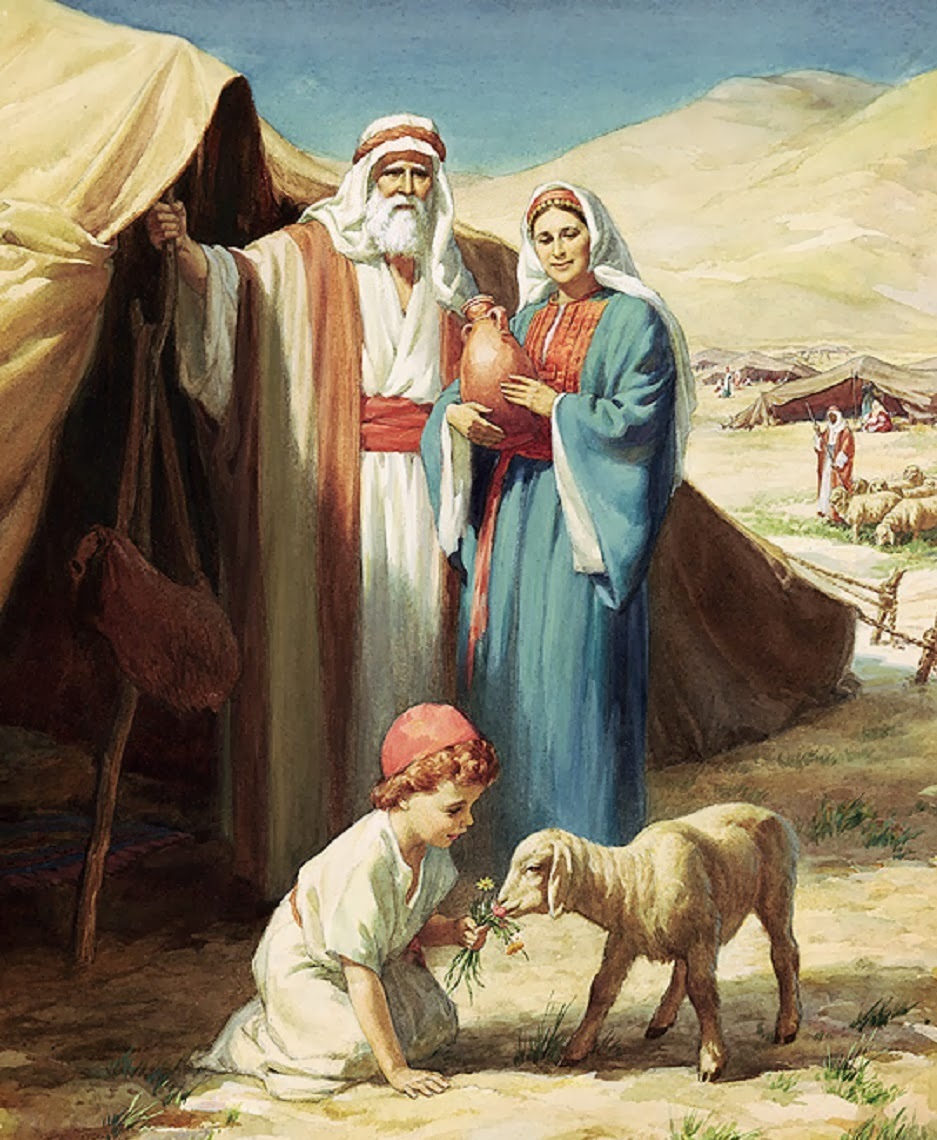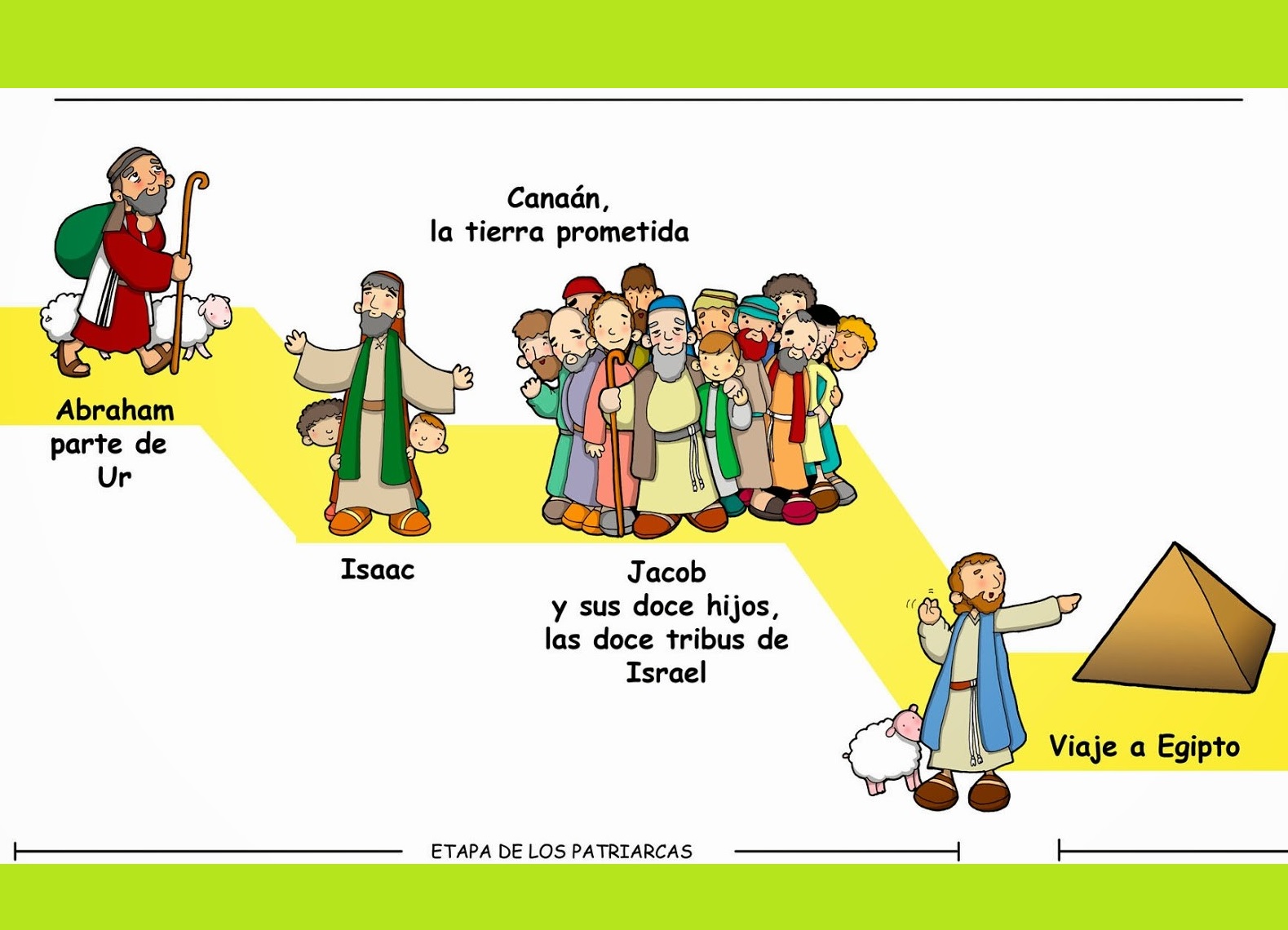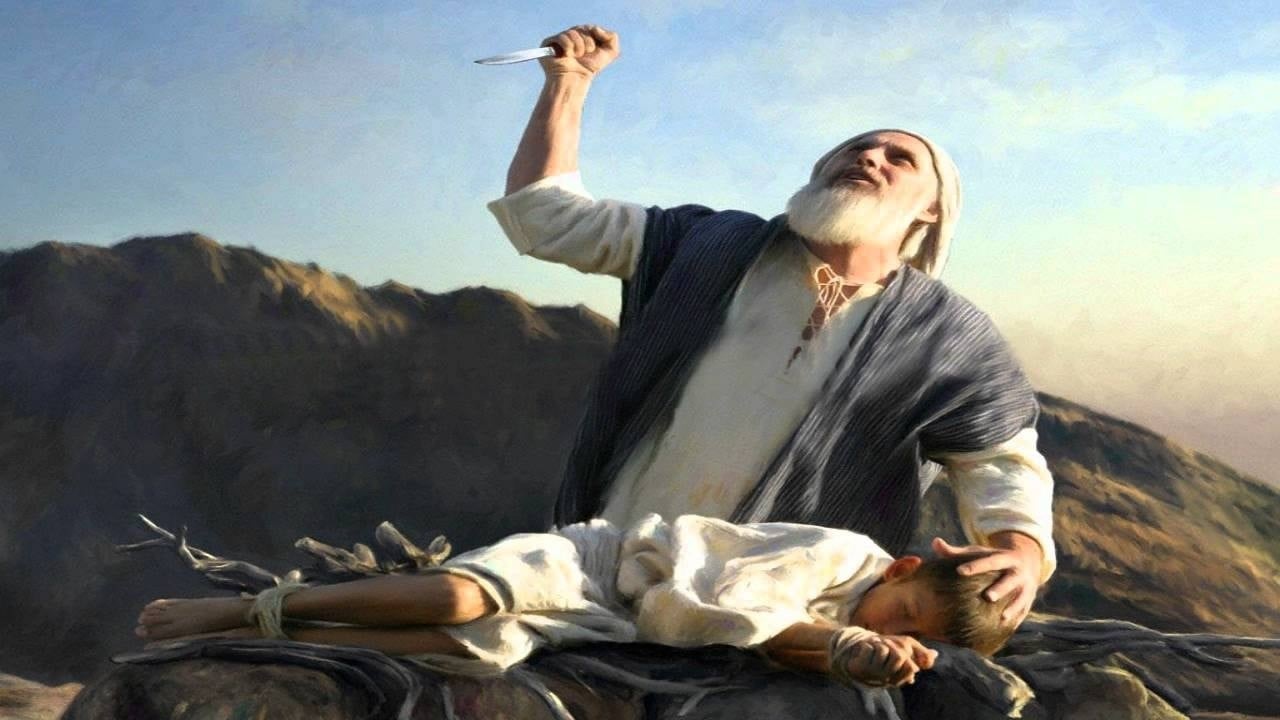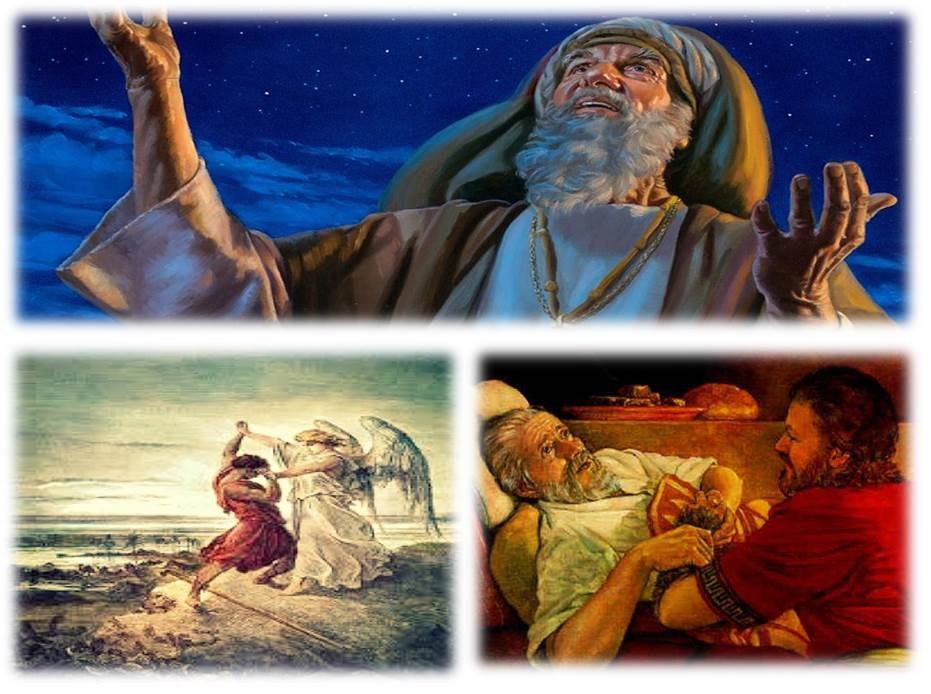Entering this article, you will be able to know with us who the Patriarchs of the Bible were. Also discover what their responsibility was in their time and what legacy they left us.

What are the Patriarchs in the Bible?
The etymology of the word patriarch is derived from the Latin translation patriarcha which comes from the ancient Greek πατριάρχης. This last word is a word composed of two Greek roots, namely:
- πατριά, πάτερ, transliterated pater: whose meaning is father, offspring.
- ἄρχω, άρχων transliterated archón: which means leader, chief or authority.
Patriarch is then, in the sense of sociology, the designation given to all those men who carry authority or lead a family. That is, the father of the family, the one who makes the decisions that correspond to the family; and the system that keeps this rule is known as patriarchy.
For its part, in the Bible, the patriarch is the designation given to the main chiefs or leaders of the stage in which the people of Israel is formed. This stage is known in the Bible as the patriarchal age.
The patriarchal age is defined by the Bible from the patriarch Abraham to his grandson Jacob. Although the patriarchs are fathers, from Adam to Noah, these fathers do not fall into the patriarchal age of the Bible.
Although some texts define these fathers of the origins as the antediluvian patriarchs. Adam besides being the first man was also the father of humanity.
If you want to know more about the first man and father of humanity, we invite you to enter the article Adán y Eva: The first pair of humans in creation. The origin of humanity is concentrated in this couple, created by God in his image and likeness, as it is written in the book of Genesis.
the patriarchal era
The patriarchal era is important to know the history of the men of God who left us the rich legacy of the bases of the foundation of the Christian faith. A faith that extends several centuries back, from the Hebrew people of God to the times of grace in the universal church of Jesus Christ.
The history of the people of Israel began more than 4 years ago with the patriarchs, Abraham, Isaac and Jacob. These patriarchs were a succession of three generations: Father, son and grandson.
The patriarchal era is defined in the history of these three patriarchs and they are described in the Bible, in the book of Genesis in chapters 12 to 50. A biblical text that opens the doors to the knowledge of God as the only creator and Lord of all what exists.
It also leads us to learn about the subject of the fall of man, to the history of the three main patriarchs of the Bible. In this sense you can enter here and learn more about the book of genesis: chapters, verses, and interpretation.
Jewish tradition has maintained a chronology from the creation of Adam to the reigns of the last kings of Israel and Judah. According to this chronology from the Rabbinical tradition and based on the ancient Jewish source of Rabbi Seder' Olam Rabbah.
The patriarchal era is located approximately in the year 1813 before Christ, with the birth of Abraham; until the death of his grandson Jacob in about 1506 BC.
Historical foundation of the patriarchs
The people of Israel is a people that has kept the history of the formation of its people from generation to generation through an essentially oral tradition. The foundation of this history is attributed by the people of Israel to a man who obeyed and was faithful at all times to the will of God.
This man is Abraham, who believes God and obeys his voice leaving his land, as well as his family. Abraham heeds the call to begin to carry out the divine plan that had been given to him, which focused on the blessing of forming a large and numerous people from love and faith.
Paradoxically, Abraham has only one son, Isaac with his wife Sarah, two sons are born to Isaac, Esau and Jacob. Jacob, the youngest of Isaac's sons, for acts committed has to flee from his father's house, later he has to live a somewhat strange experience with God, marking his life from that moment on.
Jacob with his willingness to work and his trust towards the creator, makes God establish him as the father of the twelve tribes of Israel. Each tribe made up of each of the twelve children he had with his two wives and their servants; The Jewish people and culture would be formed from the twelve tribes of Israel.
Originally, what did the people of Israel know of their Patriarchs?
The first ancestors of the Israelite people did not leave anything in writing about their history. In such a way that the successive young generations were finding out about the acts of their ancestors through the verbal account of the elders of the town.
From these stories emerged the story of Abraham, at the time when the nomadic Hebrew tribes made the journey with their flocks from the desert to Egypt. In this story Abraham's faith was told, he spoke of his trust in God and the promise he made to bless him with a great people.
The stories also spoke of Isaac, the son that God promised to Abraham and who was conceived in his old age and his wife Sarah. A story that manifested the prodigy and power of the God of Abraham.
Then there is the told story of Jacob, who was considered the father and founder of the Israeli people, with the twelve tribes, each representing one of his sons. Years later, some enlightened people from Israel, as well as Moses, began to write the whole story.
Which was embodied in scrolls and manuscripts that are still preserved by the Jews. These scriptures centuries later were transcribed in the book of Genesis in the Bible.
Stories that were captured so that today every believer can understand and comprehend the origin of God's plan. Mainly, the birth of the people of Israel, its traits and characteristics are established; the most important being the faith of this people in one God.
Who were the main patriarchs?
The characters of Abraham, Isaac and Jacob, represent the main patriarchs or founders of Judaism, as well as Christianity. The Christian Bible in the Old and New Testaments is named multiple times, alluding to the God of the fathers (the patriarchs) Abraham, Isaac and Jacob:
Exodus 4:5 (KJV 2015): -This is so that they may believe that the LORD has appeared to you, the god of their fathers, the God of Abraham, the God of Isaac and the God of Jacob.
Matthew 22:32 (ESV): “I am the God of Abraham, Isaac and JacobAnd he is not God of the dead, but of the living!
Let us now learn a little about who these main fathers of the faith were, and the first to obediently follow the will of God.
Abraham the first of the patriarchs
Abraham's story is not just someone's story, it goes further. Because it is a compendium of what the true faith is.
The story of Abraham's life represents the steps and tests that he had to live, and that, despite them, he always remained firm in his trust in God. Abraham's life also represents an example for any believer today, when he has to face his own trials at some point in his life.
The story of this first patriarch begins with his departure to an unknown land, leaving his entire family behind. Trip that he makes responding to a call from God
Genesis 12:1 (NIV): -One day the Lord said to Abram: -Leave your land, your relatives and your father's house, to go to the land that I am going to show you-.
From there begins the proven faith of Abraham, typical of the people of God. Later this man of faith makes a great show of kindness by letting his nephew Lot choose first between the lands of the north and those of the south (Genesis 13: 8-9).
Without knowing it, he was demonstrating what the good and true land is, the true heart of man, where the Kingdom of God is established.
Later Abraham full of anxiety talks with God:
Genesis 15:2-4 (RSV): Abram answered: -My Lord and God, what can you give me, if I have no children, and the steward of my house is that Eliezer from Damascus? – 3 Abram also said: -Look, you have not given me offspring. My heir will be a slave born in my house. 4 But the word of the Lord came to him, and he said to him, "Your heir will not be this, but your own son."
God makes a covenant with Abraham
Abraham before this promise believes God demonstrating his faith by trusting in a promise that in the thought of man is unrealizable. From that day on, God establishes an alliance with Abraham and a friendship begins between them.
God approved of Abraham because when he told him “Fear not”, this man's response was to place his trust in the Lord. The alliance is sealed according to the custom of that time, which consisted of passing between the two halves of a sacrificed animal, (Genesis 15:9-21)
Jeremiah 34:18 (RVC): -To those who transgressed my covenant and did not fulfill its terms, which agreed in my presence, I will split them in two, in the same way that the calf with which the pact was sealed was split in two. I'm going to split in two.
This gives us a teaching and it is that faith makes us friends of God, and being a friend represents being intimate with the Lord. God gives his friend Abraham the son of the promise to Isaac, know here about Intimacy with God: How to develop it?
God's promise to Abraham
Genesis 17:5-9 (NIV): Hearing this, Abram bowed as a sign of respect. Then God said to him: - In this pact that I make with you, I promise you the following: Many nations will be born from you. That is why you will no longer be called Abram, but Abraham, because you will be the father of many nations, and many of your descendants will be kings. This pact that I make with you, I also make with your descendants, and it will never end. I am your God, and I will also be the God of your descendants. The land of Canaan, where you now live as a foreigner, I will give to you forever, and also to your descendants.
The Second Patriarch Isaac
After God's promise to Abraham over the years, Sarah appears to him as she had announced. So that after many years God complies, being Isaac the son of the promise.
Isaac was born against all hope or human reasoning, that this promise of God could be fulfilled in the conditions in which his parents were. Sarah being a very old woman, she gives birth to Abraham's son.
Isaac the second patriarch inherits God's promise to Abraham for his descendants. God carries out his plan firmly, but without offending anyone.
God tests Abraham with his son Isaac, but after the test, he understands that he loves his son the way God wants him to love him. Since he preferred God even before his own son, whom he had waited for many years.
This teaches us that God likes and approves our dedication or the obedience we have with Him. That is, if at any time, we have shown him that we are willing to leave or deliver something, because he has asked or demanded it.
In the request that God made to Abraham, both the father and the son Isaac were united in the same sacrifice. Isaac, for his part, accepted his fate as a sacrifice to God, carrying the wood that was to fuel the fire beneath him.
However, God saved him through the faithful obedience of his father Abraham and blessed him along with his descendants.
The third patriarch Jacob
Isaac son of Abraham has two sons named Esau and Jacob. The third patriarch would be Jacob who, unlike Abraham, would become aware of his call from a young age.
Jacob, first, buys Esau his birthright, since he judged him and considered him irresponsible. However, he did not know the price that God's blessing brought to his parents.
Jacob needed his mother to encourage him to expose himself to stealing the blessing, in this way he allowed himself to be convinced. Only after carrying out the deed did he understand the consequences of his act, having to flee to save his life.
But since Jacob has to lead the life of a fugitive stranger, it is that he has his encounter with God. There he becomes aware of the responsibility assumed, being the only heir to the promises of God.
The Bible shows the patriarch Jacob as a strong, cunning man with great confidence in the promises of God. God's blessings accompany Jacob in his fugitive life, being a persevering worker.
After fifteen years have elapsed, Jacob has two wives, twelve children and a great material fortune. At that time is when he returns to the land of his fathers and prepares to face his brother Esau, Jacob would finally form the nation of Israel.
The legacy or message of the patriarchs for today
All of humanity to a greater or lesser degree believes in something, perhaps, in some, what they believe in will reassure them. That action of believing is called faith, believing in something or having faith in something gives confidence, but does it generate a commitment?
Perhaps not faith as the world sees it, an example is atheist people. They do not believe in God, but if they have their own beliefs, they do not assume any commitment, apart from the one they have with their own human reasoning.
While the faith that the Bible tells us about is based on believing in someone who calls us to walk a path with Him. That someone is God, creator of heaven and earth and everything in her.
When as believers we respond to God's call, we also assume the commitment to follow the path that He traced according to His purpose for each one of us. We begin to live and enter into a story fully trusting in God and walking together with Christ.
Abrahamic Legacy
Biblical faith begins precisely with the Patriarch Abraham, the apostle Paul recognized and shows us Abraham as the very prototype of faith. Abraham did not make himself righteous before God because of what he did or did not do, but he placed all his trust in the Lord, (read Romans 4: 1-25):
Romans 4:3 (NIV): The Bible says: -God accepted Abraham because Abraham trusted God-.
God makes the call to Abraham with authority in the same way that he did with the prophets in his time. In our time in the same way our faith is born from a call from God.
By believing, God gives us a measure of faith, we did nothing to deserve it. This measure of faith is the same for everyone, but the responsibility of each one is to make it grow and mature.
Abraham by himself did not make the decision to leave his land for another, nor did he seek a new way to serve God. The Lord tests those who receive the call so that they can grow in faith.
God reserves his greatest gifts for those who stand firm in the call of faith, even in times of trial.
1 Peter 1:7 (NLT): These tests will prove that your faith is genuine. It is being tested in the same way that fire tests and purifies gold, although your faith is much more precious than gold itself. Then your faith, by remaining firm in so many trials, will bring you much praise, glory and honor on the day that Jesus Christ is revealed to the whole world..
Jacob's Legacy
Jacob teaches us with his prayer to God (Genesis 32:9-12) that praying is not just asking for his will to be fulfilled in us and asking for the necessary strength to accept it. Praying is also challenging God, trusting in his promises and knowing that he attends to our pleas.
Similarly, Jacob teaches us that even when God's promises seem to fade, we must grow in love and faith to continue in search of his will. God asks Jacob to make the sacrifice that he would return to his land and to his relatives, so that he would serve as an example to other fathers.
Jacob complies with the Lord despite the fear he had to face his brother Esau, because he knew the promise that was deposited in him as a descendant of Abraham. Likewise, each one of us is discovering our duty and our mission in the service of Christ, as members of his Church.
However, that does not mean that carrying out our mission leads to doing it without any effort or that everything will go well. Because just as it happened with Jacob, we must have the desire and the will to forge our lives according to God's purposes.
In addition to not losing faith, and that at the end of everything, what God promised will be fulfilled. Today, many believers are aware of what should be done to make the world we live in better and fairer.
But we make no effort to carry it out. We did not make the decision to become fighters like Jacob was at the time, who snatched the blessing promised by God from him.





